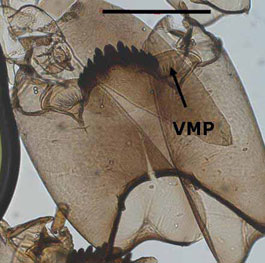Small insects tell us Earth is warming
Small insects tell us Earth is warming
mongabay.com
December 11, 2006
Small insects known as midges are telling scientists that Earth is warming, according to research to be presented December 15 at the annual meeting of the American Geophysical Union in San Francisco.
David Porinchu, the study’s lead author and an assistant professor of geography at Ohio State University, says that a dramatic shift in the types of midges inhabitating six remote mountain lakes in the western United States shows that temperatures are indeed climbing.
“Climate change has had an overriding influence on the composition of the midge communities within these lakes,” said Porinchu. “The data suggest that the rate of warming seen in the last two decades is greater than any other time in the previous century.”

A head capsule belonging to a midge of the Dicrotendipes group. Midges in this group prefer slightly warmer water temperatures. Researchers use certain characteristics of head capsules, including teeth, to differentiate between different types of midges. Photo courtesy of David Porinchu. |
The findings suggest that “warmer-water midges began to edge out cooler-water midge species around these remote lakes” beginning about 25 years ago.
“People would like to believe that these mountainous environments may be immune to climate change, but these are some of the first areas to feel the impact of warmer temperatures,” Porinchu said.
The researchers found that surface water temperatures in the lakes they studied have increased from 0.5 to 1 degree since the 1980s.
“Although that doesn’t seem to be a huge increase, just a slight fluctuation in water temperatures can significantly affect the rate of egg and larval development,” Porinchu said. “Above-average surface water temperatures typified the late 20th century in all of the lakes that we studied. It’s clearly an indication that something is happening that is already affecting aquatic ecosystems in these fragile, high-elevation lakes.”
This article is based on a news release from Ohio State.







